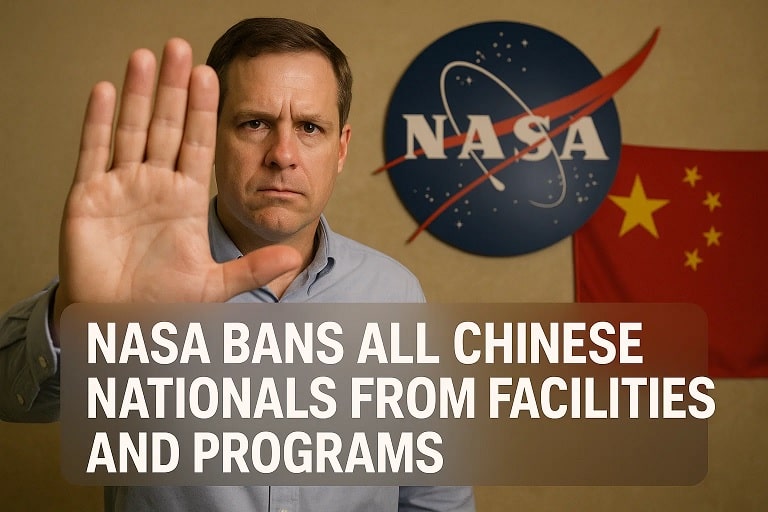NASA Bans All Chinese Nationals from Facilities and Programs: Heightened Tensions in the US-China Space Race
In a significant escalation of geopolitical tensions, NASA has implemented a comprehensive ban on all Chinese nationals from accessing its facilities and participating in its programs, effective as of early September 2025. This policy, which applies even to those holding valid US visas, prohibits physical entry, virtual meetings, and access to NASA’s data systems. The move underscores the intensifying rivalry between the United States and China in space exploration, amid concerns over national security and technology transfer. As the two superpowers vie for dominance on the Moon and beyond, this ban signals a new chapter in restricted international collaboration. This detailed guide explores the ban’s details, recent developments, historical background, potential impacts, future implications, and more to provide a full perspective on this pivotal policy shift.
Understanding NASA’s Ban on Chinese Nationals
The ban represents a stringent measure to safeguard US space assets and intellectual property. Chinese nationals, including scientists, researchers, and collaborators, are now barred from NASA’s premises, online platforms, and any program-related activities. This includes Zoom calls, data access, and in-person meetings, effectively halting ongoing joint projects and excluding them from future initiatives.
Key Aspects of the Policy
- Scope: Applies to all Chinese citizens, regardless of visa status or prior involvement.
- Implementation Date: Took effect on September 5, 2025, with immediate disruptions to affected individuals.
- Rationale: Driven by national security concerns amid the US-China space race, including fears of espionage and technology theft.
- Exceptions: None explicitly stated, though congressional approval could potentially allow limited collaborations under strict oversight.
Latest Events and News Surrounding the NASA Ban
Official Implementation on September 5, 2025
On September 5, 2025, NASA quietly enforced the ban, revoking access for Chinese nationals involved in its programs. This led to abrupt cancellations of meetings and data sharing, catching many collaborators off guard. Reports emerged of Chinese scientists being locked out of systems mid-work, highlighting the policy’s swift rollout.
Public Revelation and Media Coverage on September 11, 2025
The ban gained widespread attention on September 11, 2025, when major outlets like BBC and The Guardian reported on the developments. NASA confirmed the policy in statements, emphasizing its commitment to protecting US interests in space exploration. The Trump administration framed it as a necessary step in escalating the space race with China.
Reactions from Stakeholders on September 12, 2025
As news spread, Chinese officials condemned the ban as discriminatory and counterproductive to global science. US lawmakers praised it for bolstering security, while international space agencies expressed concerns over fragmented cooperation. Social media erupted with debates on the implications for lunar missions and beyond.
Historical Context: US-China Space Relations and Restrictions
US restrictions on Chinese involvement in space activities trace back over a decade, rooted in broader geopolitical strains. The Wolf Amendment, enacted in 2011, prohibited NASA from using federal funds for bilateral cooperation with China without explicit congressional approval. This was in response to concerns over human rights and military-linked technology transfers. Over the years, tensions have mounted with China’s rapid advancements, including its lunar landings and space station development.
Timeline of Key US-China Space Policy Events
| Year | Event | Description |
|---|---|---|
| 2011 | Wolf Amendment Passed | Bans NASA-China cooperation without congressional consent. |
| 2018 | US-China Trade War Begins | Heightens scrutiny on technology exchanges, including space tech. |
| 2022 | China Completes Tiangong Space Station | Sparks US concerns over independent Chinese space capabilities. |
| 2024 | Artemis Accords Expansion | US-led initiative excludes China, promoting alternative alliances. |
| 2025 | NASA Ban Implemented | Comprehensive exclusion of Chinese nationals from facilities and programs. |
Impacts of NASA’s Ban on Global Space Exploration
Immediate Effects on Scientists and Programs
The ban has displaced numerous Chinese researchers working on NASA projects, leading to project delays and loss of expertise. Fields like climate science, astrophysics, and planetary exploration, which benefited from international input, now face setbacks.
Broader Geopolitical and Economic Ramifications
This policy intensifies the US-China space race, potentially accelerating China’s independent programs and fostering alliances with other nations like Russia. Economically, it could strain US-China trade relations further, affecting billions in technology exports. For the global community, it risks fragmenting space efforts, such as the International Space Station’s successor projects.
Social and Ethical Considerations
Critics argue the ban is overly broad and discriminatory, potentially alienating talented scientists and hindering diversity in STEM. It may also exacerbate anti-Asian sentiments amid rising geopolitical tensions.
Future Scopes: What Lies Ahead for US-China Space Dynamics
Looking forward, the ban could evolve into more permanent legislation, further isolating China from Western space initiatives. By 2030, this might lead to parallel space ecosystems: a US-led Artemis program versus China’s lunar base ambitions. Potential for diplomatic thawing exists if security concerns ease, but current trajectories suggest continued rivalry.
Emerging Trends and Scenarios
- Technological Divergence: Accelerated development of independent capabilities, with China advancing in reusable rockets and Mars missions.
- International Alliances: China may strengthen ties with BRICS nations for collaborative space projects.
- Policy Revisions: Future US administrations could relax restrictions if global threats subside.
Frequently Asked Questions (FAQs)
When did NASA’s ban on Chinese nationals take effect?
The policy was implemented on September 5, 2025, with immediate revocation of access to facilities and systems.
Does the ban apply to all Chinese citizens?
Yes, it encompasses all Chinese nationals, including those with valid US visas, barring them from physical, virtual, and programmatic involvement.
What is the main reason for this ban?
It stems from national security concerns amid the escalating US-China space race and fears of technology transfer.
How might this affect ongoing NASA projects?
Projects involving Chinese collaborators face delays, with potential shifts to alternative international partners.
Could the ban be lifted in the future?
Possibly, through congressional action or policy changes, but current tensions suggest it may persist.
What are the implications for global space cooperation?
It could lead to fragmented efforts, reducing shared knowledge and increasing competition over resources like lunar sites.
NASA’s Ban: A Defining Moment in Space Diplomacy
NASA’s decision to ban all Chinese nationals from its facilities and programs marks a critical juncture in international relations, prioritizing security over collaboration. As the space race heats up, this policy could redefine global exploration, urging nations to navigate between competition and unity for the greater good of humanity’s cosmic ambitions.
Key Takeaways
- Security Focus: Ban protects US space tech amid rivalry.
- Global Ripple: Affects scientists, projects, and alliances.
- Future Rivalry: Likely to spur independent advancements.
- Diplomatic Challenge: Calls for balanced international policies.














